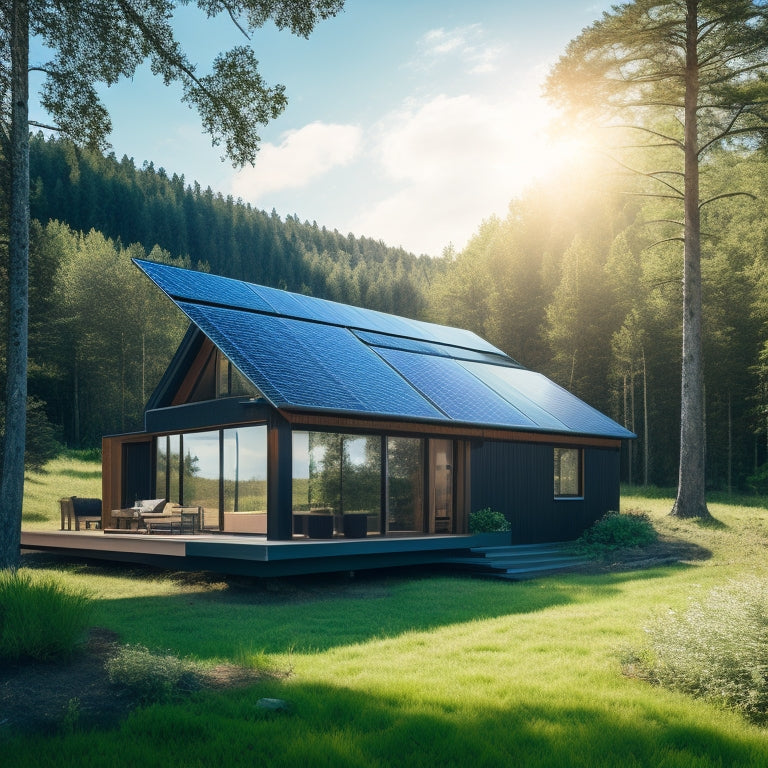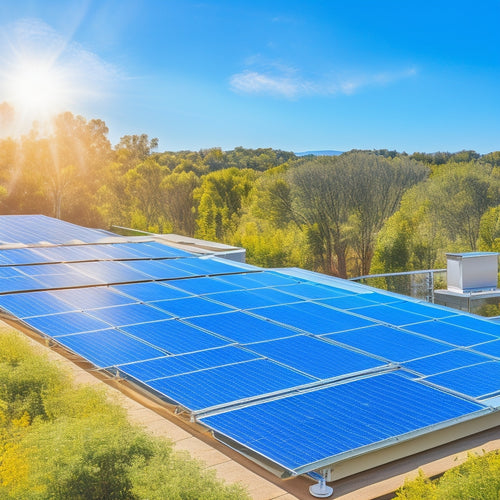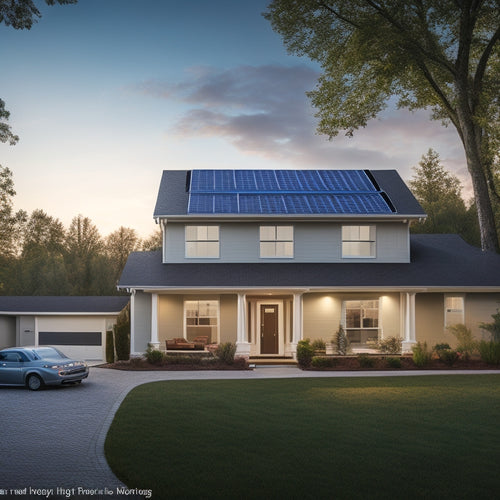
Maximizing Off-Grid Solar Panel Energy Harvesting Tips
Share
To maximize your off-grid solar panel energy harvesting, optimize your system's orientation by facing panels within 20 degrees of true south and adjusting for seasonal changes. Regularly clean your panels every 2-3 months to maintain peak energy production. Monitor your energy output closely to identify areas of improvement, and reduce energy waste and loss by analyzing your consumption patterns. Consider upgrading to high-efficiency panels and exploring energy storage options. By implementing these tips, you can enhance your energy harvesting efficiency. Now, take the next step to reveal even more potential from your off-grid solar panel system.
Key Takeaways
• Ensure optimal panel orientation within 20 degrees of true south (or north in the southern hemisphere) for maximum energy production.
• Conduct regular cleaning and maintenance every 2-3 months to remove dust and debris, and adjust panel angles for enhanced energy harvesting.
• Implement a monitoring system to track energy production in real-time, identify trends and anomalies, and adjust system configuration accordingly.
• Upgrade to high-efficiency panels (>20% efficiency) to enhance energy yield and maximize energy harvesting.
• Properly size energy storage systems based on daily energy needs and battery capacity to ensure reliable power supply during low sunlight or nighttime.
Optimize Solar Panel Orientation
When positioning your solar panels, make sure they face within 20 degrees of true south (or north in the southern hemisphere) to maximize energy harvesting. This orientation allows your panels to capture the most sunlight throughout the day.
However, you'll need to make seasonal adjustments to optimize energy production. During the winter months, the sun is lower in the sky, so you'll want to tilt your panels at a steeper angle to capture more sunlight. Conversely, during the summer months, the sun is higher, so a shallower tilt is more effective.
Conduct a shading analysis to identify any obstructions that might be blocking sunlight from reaching your panels. Trees, buildings, and other structures can cast shadows that reduce energy production. Consider trimming trees or relocating panels to minimize shading.
Clean and Maintain Panels Regularly
When you're relying on solar panels for off-grid energy, it's essential that you clean and maintain them regularly to guarantee peak performance.
You'll need to remove dust and debris, optimize panel angles, and use the right cleaning solutions to avoid damaging the panels.
Dust and Debris Removal
Regular cleaning of your solar panels is essential, as dust and debris can reduce energy output by up to 25% in high-dust environments. You may not realize it, but even a thin layer of dust can greatly impact your energy harvesting.
If you live in an area prone to dust storms, it's important to clean your panels regularly to maintain peak energy production.
Dust and debris can accumulate quickly, especially during periods of high winds or environmental disturbances. Failure to clean your panels can lead to a notable decrease in energy output, which can have a substantial environmental impact.
In fact, a study found that dirty solar panels can reduce energy output by up to 40% in extreme cases. To avoid this, you should clean your solar panels every 2-3 months, or more frequently if you live in a high-dust area.
Use a soft-bristled brush and a mild soap solution to gently remove dirt and debris. Avoid using harsh chemicals or abrasive materials, as they can scratch your panels.
Panel Angle Optimization
By adjusting the angle of your solar panels, you can greatly enhance energy harvesting, particularly during seasonal changes when the sun's position varies. As the Earth's tilt and orbit change throughout the year, the sun's rays hit your panels at different angles, affecting energy output. To maximize energy harvesting, you'll need to make seasonal adjustments to your panel angle.
Regional variations in solar irradiance also impact energy production. In regions with high latitudes, the sun's angle changes more dramatically throughout the year, requiring more frequent adjustments. In contrast, regions near the equator experience relatively consistent solar irradiance, allowing for fewer adjustments.
To optimize energy harvesting, consider the following: during winter, tilt your panels at a steeper angle to capture more energy from the lower sun. In summer, adjust the angle to a shallower tilt to minimize energy loss due to high temperatures.
Cleaning Solution Guidelines
You'll need a gentle yet effective cleaning solution to remove dirt, grime, and other obstructions that can reduce your solar panels' energy output by up to 25%. When selecting a cleaning solution, consider the water quality and soap types to prevent damaging your panels.
| Soap Type | Recommendation |
|---|---|
| Mild dish soap | Recommended for most solar panels |
| Harsh chemicals | Avoid, as they can damage panel coatings |
| Ionic soap | Suitable for panels with specific coating requirements |
When mixing your cleaning solution, use deionized or distilled water to deter mineral buildup on your panels. Aim for a solution of 1% soap concentration to guarantee effective cleaning without residue buildup. Avoid using high-pressure washes, abrasive materials, or scrubbers, as they can scratch or damage your panels. Instead, use a soft-bristled brush or a microfiber cloth to gently remove debris. Regular cleaning will help maintain your solar panels' energy output and extend their lifespan.
Monitor Energy Output Closely
Monitoring your solar panel system's energy output closely is crucial for identifying performance issues and taking prompt corrective actions to ensure maximum energy harvesting. You can't optimize what you don't measure, so it's vital to regularly monitor your system's energy output. This allows you to detect any performance dips or anomalies, making it easier to take corrective action.
To get the most out of your solar panel system, make sure to:
-
Set up a monitoring system that tracks energy production in real-time
-
Use performance analytics to identify trends and patterns in your energy output
-
Compare your system's performance to industry benchmarks and standards
-
Regularly review energy tracking data to identify areas for improvement
-
Adjust your system's configuration or maintenance schedule as needed based on the data
Reduce Energy Waste and Loss
As you work towards maximizing your off-grid solar panel energy harvesting, it's crucial to reduce energy waste and loss.
You can begin by monitoring your energy consumption patterns to identify areas of inefficiency, and then optimize your energy storage systems accordingly.
Monitor Energy Consumption
Accurately tracking your energy consumption patterns helps identify areas of inefficiency, allowing you to optimize your off-grid solar panel system's performance and minimize energy waste. By monitoring your energy consumption, you can pinpoint devices or appliances that are guzzling energy and take corrective action.
Here are some ways to monitor your energy consumption effectively:
-
Install energy meters to measure the energy output of your solar panel system and track your energy usage patterns.
-
Use smart plugs to monitor the energy consumption of individual appliances and devices.
-
Implement a monitoring system that provides real-time data on your energy usage and production.
-
Analyze your energy usage patterns to identify areas of inefficiency and optimize your energy consumption habits.
-
Set up alerts and notifications to inform you of any unusual energy usage patterns or anomalies.
Optimize Energy Storage
By optimizing your energy storage system, you can greatly reduce energy waste and loss, ensuring that the hard-won energy harvested from your off-grid solar panels is effectively utilized. A well-designed energy storage system is important for achieving grid independence.
To maximize energy harvesting, it's important to select batteries that can withstand numerous charge and discharge cycles, thereby extending their lifespan. You should consider batteries with a high number of life cycles to minimize replacement costs and reduce electronic waste.
Additionally, it's crucial to monitor battery health and perform routine maintenance to prevent premature degradation. By doing so, you'll be able to optimize your energy storage system, reducing energy waste and loss, and ensuring a reliable supply of electricity.
This, in turn, will enable you to enjoy the benefits of grid independence, while minimizing your reliance on non-renewable energy sources.
Upgrade to High-Efficiency Panels
You can greatly enhance your off-grid solar panel system's energy yield by upgrading to high-efficiency panels, which can convert up to 22.8% of sunlight into electricity. This significant improvement in energy conversion rates can lead to substantial gains in your system's overall performance. Although high-efficiency panels come at a higher cost, the increased energy output can offset the additional expense over time.
When considering an upgrade, keep the following factors in mind:
-
Panel Costs: While high-efficiency panels are more expensive, they can provide a higher return on investment in the long run.
-
Efficiency Ratings: Look for panels with high efficiency ratings (>20%) to maximize energy harvesting.
-
Durability: High-efficiency panels are often built with more durable materials, ensuring a longer lifespan.
-
Space Efficiency: High-efficiency panels can produce more energy per square foot, making them ideal for systems with limited space.
-
Certifications: Make sure your high-efficiency panels meet industry certifications, such as UL and IEC, to guarantee quality and performance.
Consider Energy Storage Options
When designing an off-grid solar panel system, incorporating a dependable energy storage solution is essential to guarantee a stable power supply during periods of low sunlight or nighttime. You'll want to contemplate the type of battery that best suits your needs. Lead-acid batteries are a popular choice due to their affordability, but lithium-ion batteries offer higher efficiency and longer lifetimes. You may also ponder other battery types, such as nickel-cadmium or sodium-ion batteries, depending on your specific requirements.
Once you've selected a battery type, it's important to properly size your energy storage system. This involves calculating your daily energy needs and determining the required battery capacity to meet those needs. You'll need to take into account factors like your system's voltage, the number of batteries, and the depth of discharge.
A correctly sized system ensures you have a reliable power supply during periods of low sunlight or nighttime. By selecting the right battery type and properly sizing your system, you'll be able to maximize your off-grid solar panel energy harvesting.
Frequently Asked Questions
Can Trees or Buildings Nearby Affect Solar Panel Energy Output?
You should consider nearby trees or buildings' shading effects on your solar panel's energy output, as obstruction analysis reveals that even partial shading can greatly diminish energy production, so positioning and planning are vital.
How Often Should I Inspect My Solar Panel System for Damage?
You should inspect your solar panel system every 6-12 months for damage, ensuring peak energy output; regular system maintenance and panel cleaning are essential to prevent energy losses and prolong system lifespan.
Are Solar Panels Affected by Extreme Weather Conditions?
You should know that solar panels are designed to withstand extreme weather conditions, boasting weather resistance and climate durability through robust materials and construction, ensuring peak performance despite harsh environmental factors.
Can I Install Solar Panels Myself or Do I Need a Professional?
You can install solar panels yourself, but consider the DIY safety risks; hiring a professional guarantees a safe and efficient installation, leveraging their expertise to maximize energy output and minimize potential hazards.
Are There Any Government Incentives for Off-Grid Solar Panel Systems?
You can benefit from government incentives for off-grid solar panel systems, including tax credits and renewable grants, which can greatly reduce your upfront costs, making your investment more affordable and environmentally friendly.
Related Posts
-

What Types of Solar Energy Devices Are Available
You'll find several types of solar energy devices available today, each customized to different energy needs. Photovo...
-

Key Components of a Reliable Emergency Power Supply System
A reliable emergency power supply system requires several key components. You need proven performance metrics to guar...
-

Cost of Solar With Battery Backup
You're investing in a solar panel system with battery backup to guarantee reliable power during outages. The cost of ...


